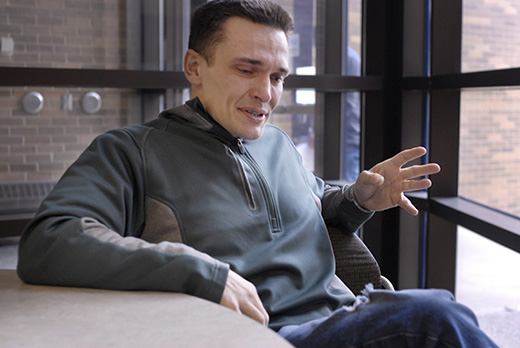
Jason Spyres chokes on emotion during an interview recently as he tries to explain how much it means to him to receive help from a Peoria orthodontist and dentist. He had been sentenced to 30 years in prison on marijuana charges, and lack of dental care in prison created major problems for him. Now in college, Spyres was trying to figure out how to pay for tuition and dental care when someone stepped in to help. (PHOTO BY CLARE HOWARD)
Jason Spyres was sentenced to 30 years in prison after three marijuana convictions. Police found 37 pounds of marijuana sent to him via United Parcel Service by his mother in California.
His mother served six months for her crime. He was released after 14 years 9 months, went into the Peoria work release program and is now trying to make up for lost time.
Spyres is set to graduate next month from Illinois Central College with a 4.0 grade point and has applications submitted to Stanford, Harvard, Yale, Dartmouth, Northwestern and more.

Illinois Rep. Jehan Gordon Booth listens to a speaker during a town hall meeting she hosted at Carver Center to discuss legalization of marijuana as a social justice issue.
Now 36, Spyres attended a recent town hall meeting at the Carver Center hosted by Illinois Rep. Jehan Gordon Booth on legalizing marijuana and social justice issues.
Gordon Booth said the legislation to legalize marijuana has both Democratic and Republican support. It makes sense economically. Colorado collected over $1 billion in 2016 with legalization in that state.
But more important than tax revenues, she said, is the blatantly unjust system of policing and law enforcement for marijuana.
Rep. Kelly Cassidy, sponsor of legislation to legalize marijuana, said discretion in enforcement can mean a white kid gets a $20 ticket but a Black kid gets a $1,000 ticket for a similar offense.
Gordon Booth said, “This is about justice reform. What the drug war has done to the Black community is devastating. The ACLU found usage equal among Blacks and whites, but Blacks are four times as likely to be arrested.”
Today, two-thirds of people in prison are there for drug offenses and their criminal record becomes a barrier for jobs and school. With limited access to jobs, the odds increase for a lifetime in poverty and committing the next generation to a life in poverty.
“Legalizing marijuana is about racial justice, social justice and economic justice,” Gordon Booth said.
Cassidy’s legislation (HB 2353) proposes to legalize marijuana for those over 21 possessing 28 grams. Legalization also would mean the purity and safety of the product becomes regulated.
There would be no legalized access for teenagers and the legislation means it becomes more difficult for those under 21 to access marijuana. Legalization in Colorado has resulted in a 75 percent reduction in the illegal street market.
“This legislation helps repair some of the damage done by the war on drugs. With a criminal record, people lose access to (subsidized) Section 8 housing as well as lose access to jobs,” Cassidy said. “This (legislation) is the ultimate restorative justice.”
Jeff Hall, a local attorney and advocate for legalization, said he attended Roosevelt Magnet School. Years after middle school, he’d meet kids who did better in school than he did but were struggling to find jobs and get out of poverty.
“I’d say, ‘What happened? You had higher grades than I did?’ The answer was they had been arrested for a dime bag. That was followed by another arrest,” he said.
For Jason Spyres, incarceration meant almost two lost decades, more than a quarter million dollars in fines, a felony record and lost teeth.
When he entered prison, he had three cavities. By the time he had access to a prison dentist three years later, infection from those cavities had spread and multiple teeth had to be extracted.
While in prison, he watched a program on C-Span that surprised him. College admissions directors on the program were discussing the evaluation process for admission. They did not only look for high grades but for a demonstration of how much could be achieved with limited resources.
“I looked around my cell. I had paper. I had a pencil. I started writing to every state representative about my story,” he said. He also started working on textbooks. He spent 6½ months working through a textbook on chemistry. He spent 7 months on a physics textbook, then a text on organic chemistry. He had to allocate 11 months for the text on calculus. Then he spent two years learning Spanish.
“I knew I had to build my toolbox with everything that could help me be successful,” he said. During his time in work release, he attended ICC full time and had a full time job, often riding his bike in zero degrees to get to work on time.
However, his mouth was a jumble of missing teeth. He knew he did not have a professional appearance. He saw an orthodontist and a dentist and was trying to figure out how to pay for dental work as well as college when the orthodontist called him back to the office. They would not charge him.
Choking on emotion, Spyres asked why they would do that for him? The orthodontist responded he just wanted to play a small part in his future success.
If there is a silver lining to his incarceration, it was the impetus it gave his parents to become clean and sober. His father was sober for seven years before he died. Spyres was incarcerated at the time and not allowed to attend the services. His mother, formerly a meth amphetamine addict, quit drugs and got a master’s degree in social work.
“I regret all the time I lost in prison,” Spyres said. “I feel survivor’s guilt on my shoulders. I got out, and I need to prove that there are many others who can be so much more than their mistakes of yesteryear, but they’re still incarcerated. I feel the weight of that responsibility. I feel the need to be a perfect role model.”
Spyres said leaving the Peoria Work Release program the first time for a job interview was terrifying. He walked to the bus station in fear he’d get on the wrong bus or be late or do something that would get him sent back to prison.
“I’m white. I don’t look scary, and I’m articulate, but it was still overwhelming. I’d sit around and panic about the littlest things. I can’t imagine how hard that would be if I were Black,” he said.
He expects to start college in the fall. He’s fast to acknowledge he did not do this alone and credits his first attorney with believing in him, pleading for clemency and giving him a laptop when he started college. His supervisor in work release, his boss at work and teachers at ICC all helped.
When Spyres was released, the state fined him $200,000 calculated with a formula based on the value of the marijuana he possessed. That fine has now increased to $263,000 with interest. He’s contacting people trying to get that fine reduced.
“I know I committed a crime, but what happened to me was wrong. There are so many others in prison today who did nothing wrong. I’m the tip of the iceberg,” he said. “I want to put a face on so many forgotten people still in prison.”
